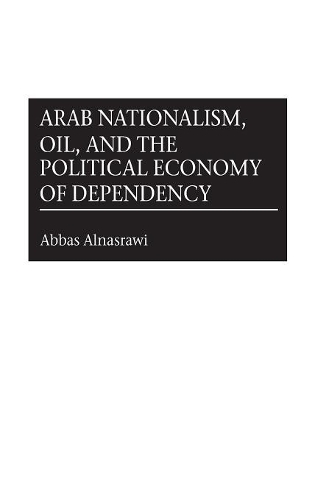
Arab Nationalism, Oil, and the Political Economy of Dependency
(Hardback)
Publishing Details
Arab Nationalism, Oil, and the Political Economy of Dependency
By (Author) Abbas Alnasrawi
Bloomsbury Publishing PLC
Praeger Publishers Inc
30th May 1991
United States
Classifications
Tertiary Education
Non Fiction
Petroleum, oil and gas industries
Nationalism and nationalist ideologies and movements
320.5409174927
Physical Properties
Hardback
232
Description
This survey covers the field from the emergence of modern Arab economic dependence to the present mid-Eastern impasse. Alnasrawi contends that Arab economic development was shaped by Arab nationalist thought, the emergence of the oil industry in the Arab region, and the integration of Arab economies into the international economic system. The volume takes a look at the evolution of each of the three forces and details their impact on the development of the Arab economies, along with their present status. The contradictions between the needs of the single state and the needs of Arab economic integration, Arab unity, and pan-Arab economic planning receive special attention. Alnasrawi develops the concept of derivative dependency, illustrating the extent to which the economies of the non-oil states are being affected by what happens to the economies of the oil-producing states. The final chapter presents a detailed picture of the forces that led to the Iraqi invasion of Kuwait and integrates the events of August 1990 with the main themes of the book.
Reviews
"This very interesting book focuses the Arab states economic dependence on the industrialized world and the resulting nationalistic reactions. The first two chapters discuss the historical evolution of this dependence from the 16th century to the present. Arab nationalism was first internationally recognized in 1913 but remained ineffective as Arab elite groups had developed interests that largely coincided with those of the industrialized countries. The establishment of Israel ignited Arab nationalism, but even the creation of OPEC in 1960 did not advance it. Only the 1973 Arab-Israeli war and the use of "the Arab oil weapon" made Arab nationalism really active. However, the author states that this oil weapon had a "built-in failure;" the oil embargo against the US and other countries drove up prices and caused an economic depression that made the industrialized countries stand up against this threat. The result was cooperation between the oil-producing Arab countries and the industrialized world to stabilize oil prices and avoid such future calamities and political separation of the oil-producing Arab countries from the others. For these reasons the economic dependency of the Arab countries on the industrialized world can be expected to continue. For university and research collections."-Choice
This very interesting book focuses the Arab states economic dependence on the industrialized world and the resulting nationalistic reactions. The first two chapters discuss the historical evolution of this dependence from the 16th century to the present. Arab nationalism was first internationally recognized in 1913 but remained ineffective as Arab elite groups had developed interests that largely coincided with those of the industrialized countries. The establishment of Israel ignited Arab nationalism, but even the creation of OPEC in 1960 did not advance it. Only the 1973 Arab-Israeli war and the use of "the Arab oil weapon" made Arab nationalism really active. However, the author states that this oil weapon had a "built-in failure;" the oil embargo against the US and other countries drove up prices and caused an economic depression that made the industrialized countries stand up against this threat. The result was cooperation between the oil-producing Arab countries and the industrialized world to stabilize oil prices and avoid such future calamities and political separation of the oil-producing Arab countries from the others. For these reasons the economic dependency of the Arab countries on the industrialized world can be expected to continue. For university and research collections.-Choice
Author Bio
ABBAS ALNASRAWI is Professor of Economics at the University of Vermont.e His previous publications include Financing Economic Development in Iraq: The Role of Oil in the Middle Eastern Economy, Arab Oil and United States Energy Requirements (1982), the EC in a Changing World Economy, and, as co-editor, Consistency of U.S. Foreign Policy: The Gulf War and the Iran-Contra Affair's Foreign Policy (1989). Since 1971 he has published numerous articles, monographs, and chapters on Arab and mid-Eastern economies.
